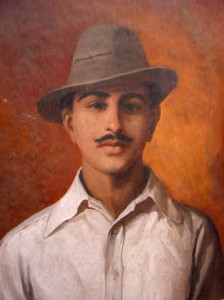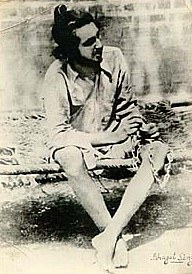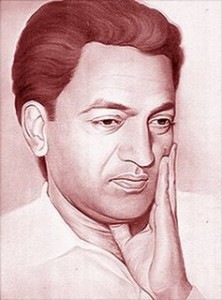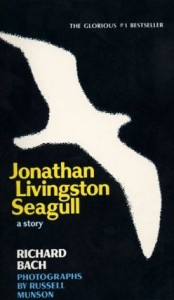Hum ne to nisaar kar diya dil,
Ab jane woh shokh, yaa na jaane.
Here I offer my heart to her,
To accept or say no is upto my sweet.
[Hasrat Mohani]
This was the ibteda (beginning) of my love. A new phase of my life, back then; I felt that it would decide my fate. If my heart is accepted, then aafreen, otherwise my name will join the list of aashiqs whose love story ended before it ever began.
I have lost the count of days since I first saw her. It must have been years and years, I believe. I still remember when I saw that beauteous face for the first time. And all I could say was,
Aap ko dekh kar dekhta rah gaya,
Kya kahoon aur kahne ko kya rah gaya.
I saw you and couldn’t take my eyes off,
What other words can describe your beauty.
[Aziz Qaisi]
I have no words to tell you how beautiful she is. Her glowing face, her long raven tresses, her honey dripping voice, her graceful gait like a gazelle, and her hazel eyes.
Yeh jafaaen gham ka chara, woh nijaat-e-dil ka aalam,
Tera husn dast-e-isah, teri yaad rooh-e-mariam.
Teri deed se siwa hai tere shauq mein bahaaran,
Woh zamin jahaan giri thi tere gaissuon ki shabnam.
Yeh ajab qayaamaten hain teri rahguzr mein guzraan,
Na hua ke mar miten hum, na hua ke ji uthe hum.
This cures oppressive griefs, that delivers the heart,
Your beauty is the hand of Christ, your memory Merriam’s face.
More beauteous than you is the love awakened earth,
Fertilized by dew of your fragrant lochs.
Strange are the calamities in the path of love,
Nor we have will to live, nor the strength to die.
[Faiz Ahmed Faiz]
And not to forget those ruby red lips,
Gharq-e-shaqar hue hain kaam-o-zabaan,
Jab liya hun main nam tuj lab ka.
My palate and tongue get honey drenched,
Whensoever I mention your lips.
[Wali Mohd. Wali]
And in this way my infatuation began. A strange feeling was all over me,
Dil-e-nadaan tujhe hua kya hai?
Aakhir is dard ki dawa kya hai?
Mai bhi munh mein zabaan rakhta hun,
Kaash puchho ke mudda kya hai?
What ails thee, my silly heart?
What balm for your ache, at last?
I too have a tongue, I too can speak,
Would that you ask, what I crave?
[Asadullah Khan Ghalib]
I was surrounded by her. She was in my dreams. She still is. I was restless. I started looking forward to seeing her each day; Wali has rightly said,
Dekhna har subah tujh rukhsaar ka,
Hai mutaala matlai-anwaar ka.
Subah tera daras paya tha sanam,
Shauq-e-dil muhtaaj hai taqraar ka.
To see your face every morn,
Is to see the glorious flush of dawn.
I saw you just this morning, Love,
Lo, my heart yearns again.
[Wali Mohd. Wali]
One is highly intoxicated when in love. Radiance of light of love spreads its aura all around you. Iqbal farmaate hain,
Anokhi waza hai saare zamaane se niraale hain,
Yeh aashiq kaunsi basti ke yaarab rahne waale hain.
Strange are their looks, out-of-this world they seem!
Wherefrom, O Lord, do these lovers spring?
[Sir Mohd. Iqbal]
I then thought of expressing myself. And thanks to the “Benevolent Lord of the Three Worlds” who arranged that also,
Baam par aane lage woh, samna hone laga,
Ab to izhaar-e-mohabbat barmila hone laga.
She now comes on roof top, face to face we stand,
Love is now proclaimed without least reserve.
[Hasrat Mohani]
But these encounters were unable to put my restless heart to rest. I then pumped all my blood into my heart and approached her, one day. I stopped her. She stopped. Smiled. I opened my mouth and ark! nothing came out of it. Them I stammered & stuttered. Her beautiful radiant face and equally beautiful smile had left me speechless. And before she left, all I could think was,
Mere dil ko kiya be-khud teri ankhion ne aakhir kon,
Ke jion be-hosh karti hai sharaab, ahista, ahista.
Your eyes,at last, have entranced my heart,
As wine benumbs our wits, step by step.
[Wali Mohd. Wali]
And all I could see was a drop of sweat, from her tresses trickled on her cheek and lo, how wondrous to see sun splashed over with dew. She again smiled and ran away. I stood there. Standing there. Still. And I told myself,
Ibtadaae ishq hai, rota hai kya,
Aage aage dekhiye hota hai kya.
It’s only the beginning, why dost thou groan?
O, wait and see what happens as you onwards move.
[Mir Taqi Mir]
I was captured by the long and deadly roots of love. More I tried to free myself, more I got entangled in them,
Yaad karna har ghari us yaar ka,
Hai wazifaa mujh dil-e-bimaar ka,
Aakbat kya howega maalum nahin,
Dil hua mubtla dildaar ka.
Remembering my Love all the time,
Is all the prayer my sick heart knows,
I know not how its going to end,
I’ve lost my heart to my sweet heart.
[Wali Mohd. Wali]
I was then avoided, tracks, streets, bazaars, changed on seeing me. I was sad,
Muddat hui sajan ne dikhaya nahin jamaal,
Dikhla apas ke kad kon kiya nahin nihaal.
For long hasn’t my Love shown her beauteous face,
Nor with her stately presence uplifted my state.
[Wali Mohd. Wali]
And I wailed,
Husn-e-be parwah ko khud bin-o-khud aara kar diya,
Kya kiya maine ke izhaare tamanna kar diya.
Beauty self-oblivious has turned self- aware,
O, why at all did I express my heart’s desire?
[Hasrat Mohani]
The days were tiring; the nights long,
Tum aae ho na shab-e-intzaar guzri hai,
Talaash mein sahar baar baar guzri hai.
Woh baat saare fasaane mein jiska zikar na tha,
Woh baat unko bahut nagawaar guzri hai.
Na gul khile hain, na unse mile hain, na mai pi hai,
Ajib rang mein ab ke bahaar guzri hai.
You haven’t come, nor has the night of waiting gone,
Looking for you the morn has called again & again.
What did not even figure in the tale entire,
To that he has taken very grave offence.
No flames, no wine, no sight of my friend,
In what queer way we’ve spent this spring.
[Faiz Ahmed Faiz]
Nobody heard my cry, but nothingness. All words were lost there. Days passed. Months passed. And even did the years. Nothing was exchanged between us. There was vast, immense, dark and dead silence. My heart was crushed, that was the first time I realized it.
Tujhiko jo yaan jalwa farma na dekha,
Baraabar hai duniya ko dekha na dekha.
Mera Guncha-e-dil hai woh dil grifta,
Ke jis ko kaso ne kabhi wa na dekha.
Aziat, musibat,malaamat, balaaen,
Tere ishq mein hum ne kya kya na dekha?
Kiya mujh ko daaghon ne sarv-e-chiraaghan,
Kabhi tune aakar tamaasha na dekha.
If here we see thee not immanent in thy grace,
What use then, our earthly pilgrimage?
My heart is such a crumpled bud,
None has ever seen it bloom.
Trouble, torture, reproach, disaster,
What all haven’t I suffered in love?
The scars within have set me ablaze,
Alas, you haven’t seen this sight.
[Khwaja Mir Dard]
I had initiated. She had taken a step back. So I coiled all my feelings around myself. Meetings became scanty. On those rare occasions when we used to see each other, I would often think,
Roya karenge aap bhi pahron isi tarah,
Atka kahin jo aapka dil bhi meri tarah.
You too shall weep for hours on end, if your
Heart, like mine, somewhere gets entwined.
[Momin Khan Momin]
Then the sky fell down on my head. She was in love with someone else. The sky had fallen over my head. The world must have reached qayaamat (end of the world). But, I could spare a smile for her,
Donon jahaan teri mohabbat mein haar ke,
Woh jaa raha hai koi shab-e-gham guzaar ke.
Bhule se muskra to diye hum aaj Faiz,
Mat puchh walwale dil-e-naakarda kaar ke.
Having lost both worlds in the game of love,
There goes lonesome man, ending his night in grief.
Today, Faiz, unawares you chanced to give a smile,
O what a swell and surge within my powerless heart.
[Faiz Ahmed Faiz]
Once, when I met her, I told her,
Mera ji hai jab tak, teri justju hai,
Zabaan jab talak hai, yehi guftgu hai,
Tamanna hai teri, agar hai tamanna,
Teri aarzoo hai, agar aarzoo hai.
Your quest is my objective, as long as I live,
Of you alone I talk, while I have a tongue,
For you alone I yearn, if yearn at all,
You are my desire, if I harbour one.
[Khwaja Mir Dard]
And I was reminded of Ghalib’s great ghazal,
Hazaaron khwaaeshen aisi ke har khwahish pe dam nikle,
Bahut nikle mere armaan, lekin phir bhi kam nikle.
Nikalna khuld se adam ka sunte aaye the lekin,
Bahut be-aabroo ho kar tere kuche se hum nikle.
Thousand of desires tantalizing one and all,
Many a wish have I realized; yet I yearn for more.
Oft have we heard about Adam’s exile from Eden,
Humiliating much more was my exit from your door.
[Asadullah Khan Ghalib]
And, with what else can I end but,
Hum parwarsh-e-loh-o-qalam karte rahenge,
Jo dil pe guzarti hai raqam karte rahenge.
Ek tarz-e-taghaaful hai so woh unko mubarak,
Ek tarz-e-tamanna hai so hum karte rahenge.
We’ll keep on plying the pen on the page,
Record shall we the tale of our heart.
A style of indifference will be her way,
A style of submission will be our creed.
[Faiz Ahmed Faiz]
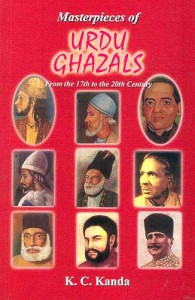
April 1995/ (revisited) May 1997
Copyright JPS Nagi.
The English translation of the Urdu poetry is taken from the book “Masterpieces of Urdu Ghazals” by K.C. Kanda, Sterling Press, India. This was the first piece of writing I put together. I was under many spells, one of them being the Urdu poetry.
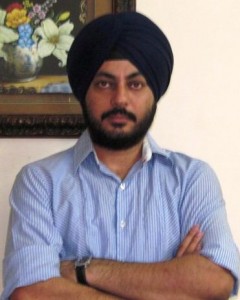 Back in the day when we were kids, we never thought where we would be when we grew up. And then we grew up. Scores of years later, I came across Rana, one more time through the internet.
Back in the day when we were kids, we never thought where we would be when we grew up. And then we grew up. Scores of years later, I came across Rana, one more time through the internet.